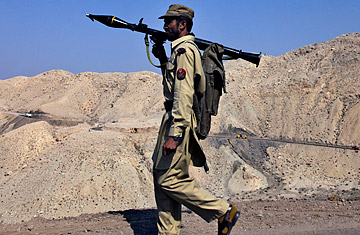
A Pakistani paramilitary soldier patrols an area along the Afghan border
America's war in Afghanistan is showing every sign of spilling over that country's borders. Early on Monday, a NATO supply convoy came under attack not far from Pakistan's capital, Islamabad, losing 27 fuel tankers torched by Pakistani Taliban militants. It was the third such attack in almost as many days. One of those attacks occurred in Sindh province, a part of the country until now untouched by the war. Apparently, there is no part of Pakistan now safe.
More ominously, on Sunday the State Department issued a terrorist threat alert for Americans traveling to Europe. Nonspecific intelligence reports have it that Pakistani militants — possibly with the backing of al-Qaeda — are preparing attacks on government and civilian targets on the continent. The threat is being taken seriously enough for European governments to have implemented extraordinary security precautions.
Frankly, none of this should come as a surprise. We're all but at war in Pakistan's remote tribal areas, where the locals have a long history of taking revenge. In September alone, the CIA launched 17 drone attacks in the area, killing an untold number of people. Some, no doubt, were Taliban or al-Qaeda, but how many civilians were killed as well? The blunt truth is that the Hellfire missiles fired from drones cannot discriminate between the guilty and the innocent. The NATO aircraft that attacked insurgents in the area last week are no more accurate — we know that those killed three Pakistani soldiers.
No one in an official position is connecting the threat in Europe to the attacks on NATO convoys. But in the absence of better intelligence, the chances aren't bad that the two may be connected. The ethnic Pashtun, who straddle the Afghan-Pakistani border and make up the social base of the Taliban in both countries, live by a feudal code of blood revenge. One reason for Pakistan's enduring reluctance to mount the broad counterinsurgency offensive the U.S. has been urging in the tribal areas is a well-grounded fear of those who live in them. Pakistanis will tell you that families there try to produce as many sons as possible, expecting to lose half of them in war. Urban myth or not, these people are unlikely to allow civilian casualties inflicted by U.S. missiles and bombs to pass unanswered. (And Pakistan's homegrown Taliban has vowed to avenge drone strikes on its leaders by striking back at the U.S. — a threat taken more seriously after attacks at a CIA base in Afghanistan and even the Times Square attempted bombing were linked back to the Pakistani Taliban.)
Sure, there's a good reason for a hot pursuit across the border into Pakistan: it's the Afghan Taliban's rear base, it's where its leaders are hiding. But we have to ask at what cost. Are we making more enemies than we are killing? And, yes, this is an intangible. But so are the motivations of Pakistani militants planning attacks in Europe. We have to fall back on common sense.
Likewise we're reduced to common sense in figuring out where Pakistan's breaking point is. The war in Afghanistan has done nothing for that country's stability, and in fact it's gotten progressively shakier over the past 10 years. Pakistanis scoff at the argument often heard in Washington that the U.S. needs to remain at war in Afghanistan partly in order to stabilize Pakistan — instead, they see the U.S. war in Afghanistan and the load that it has placed on Islamabad as being the major cause of the instability in their country. In other words, they have a very different idea of what another 10 years of war in Afghanistan or a full-fledged bombing campaign against the tribal areas will do for Pakistan's security.
